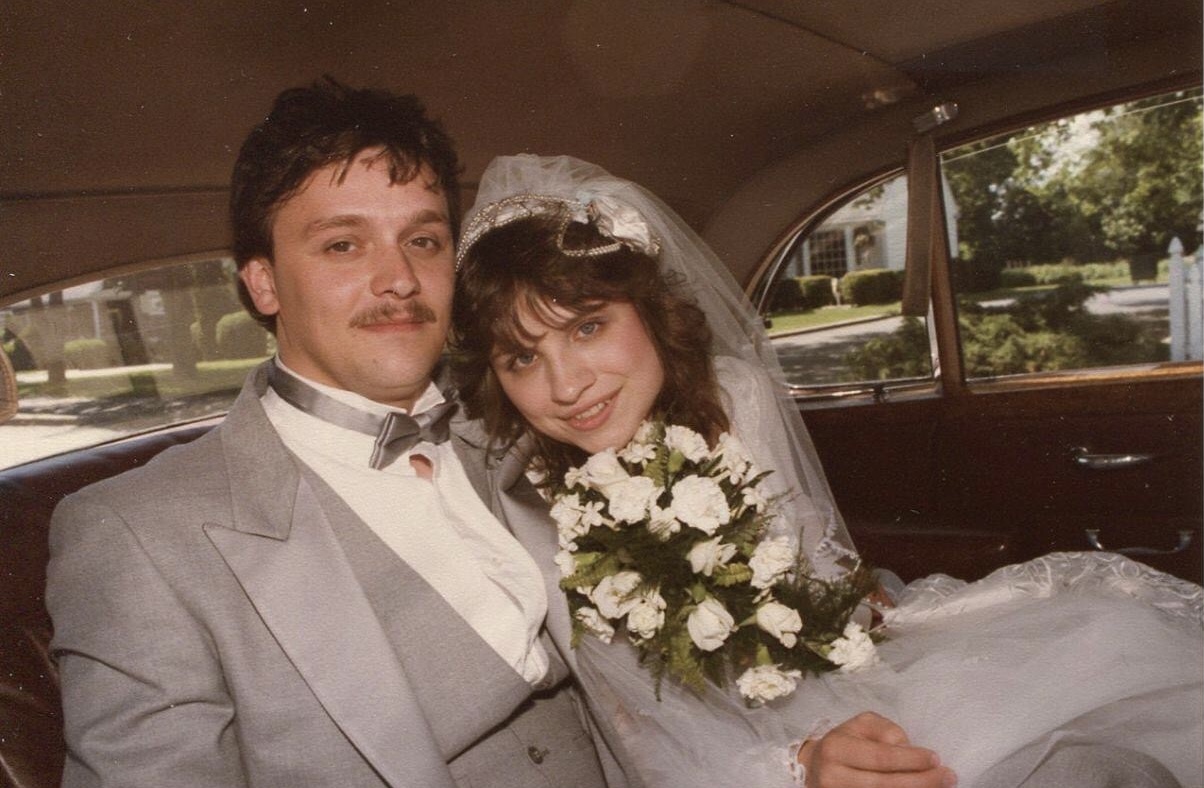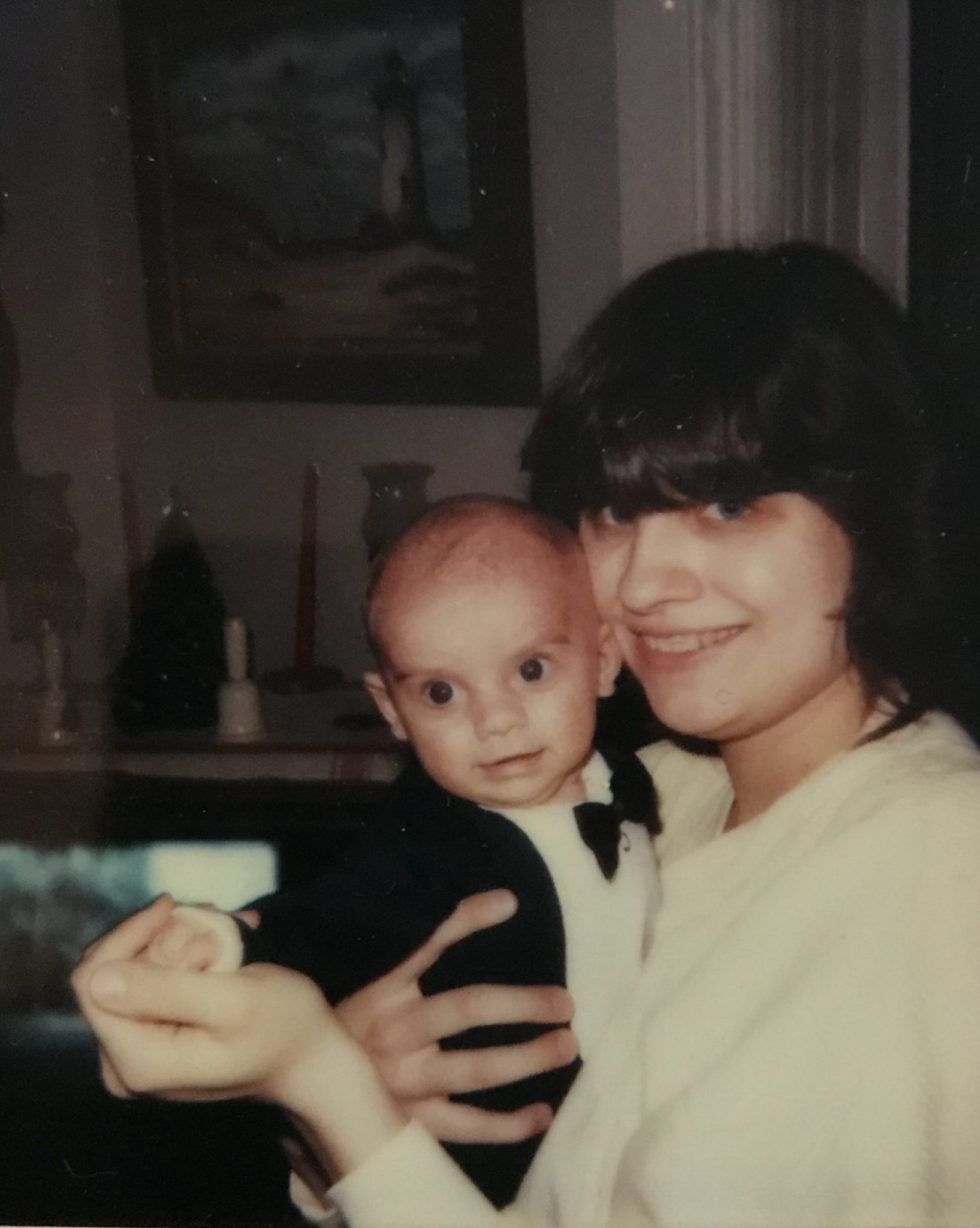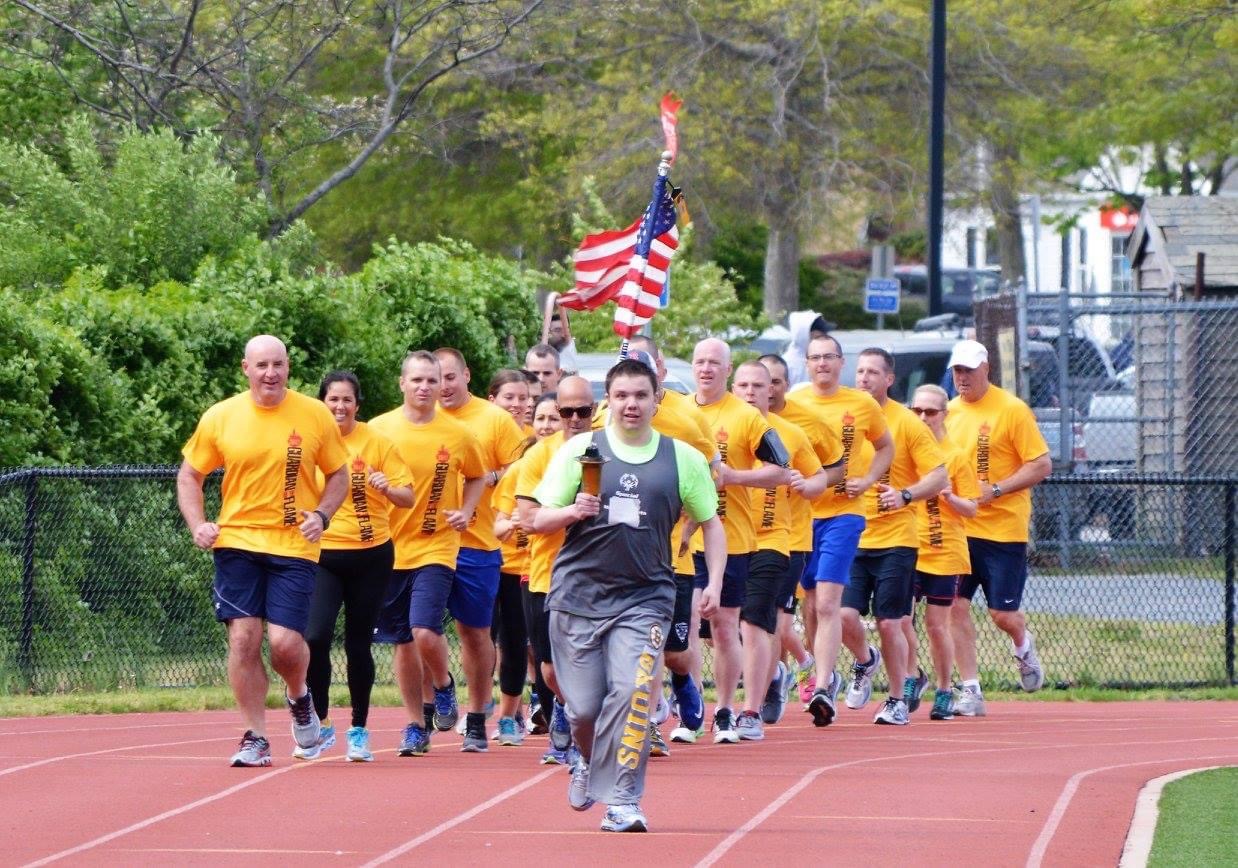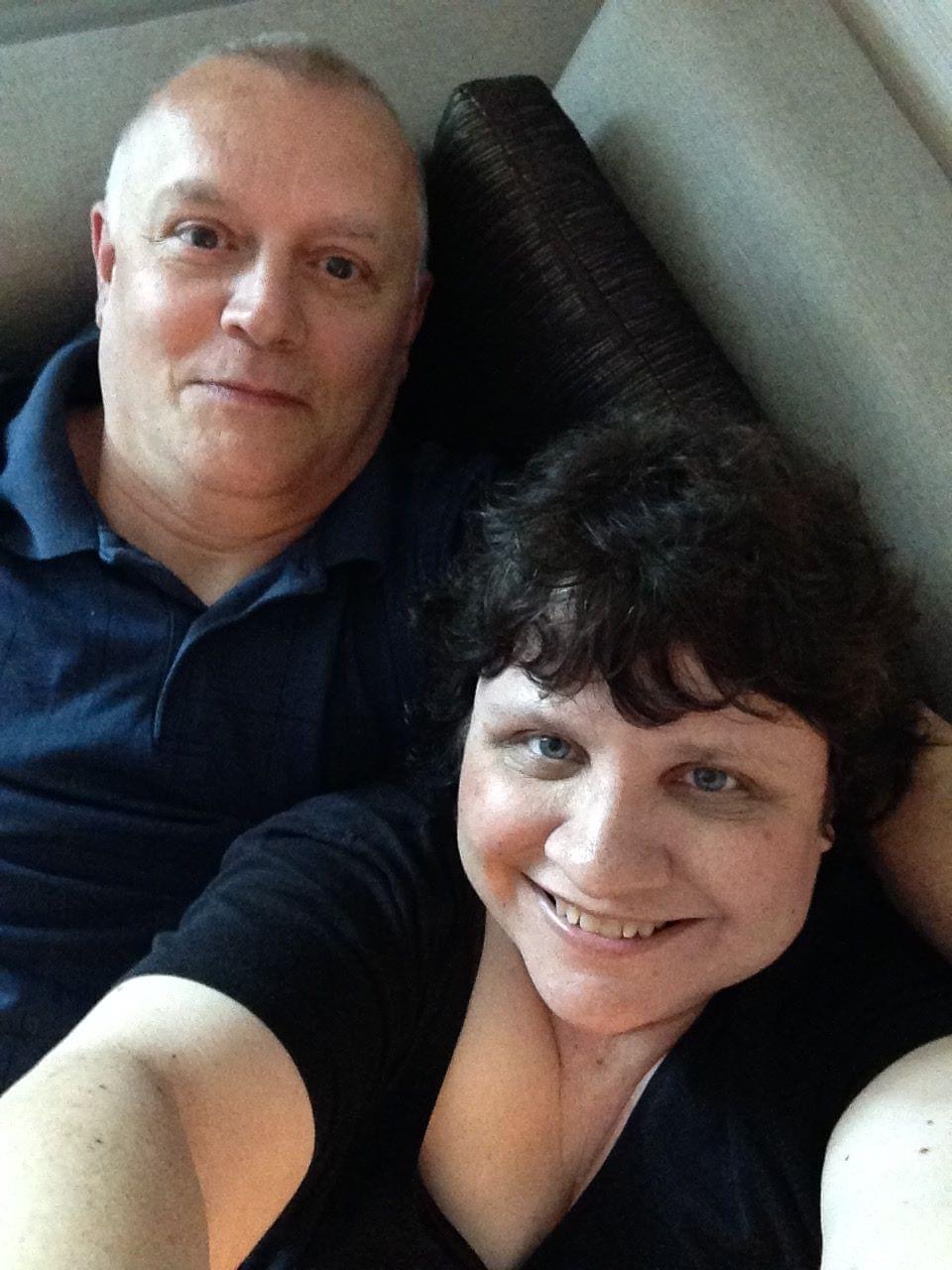I first sat down with Cathy Taylor in between her errands on a Sunday afternoon. It was easier that way, as her absence from home is always dutifully scrutinized by her son, Justin. She’d given him a complete report on where she was going and what time she’d be home. Smiling, she described his needing to know the details of her day-to-day schedule and his strict adherence to routine. We got to work quickly to ensure she would be home at her stated time. To some, this lifestyle might sound frustrating, but Cathy takes it with a grain of salt. She is easy-going, adaptable, intelligent, patient…and fierce; all traits which make her the perfect “Justin Mom.”
Taylor, 56, grew up in Hyannis, Massachusetts. The middle child of three, she spent her early years hoping the other kids at school wouldn’t say hello to her, simply because she was uncomfortable saying hello back to them. School can be pretty tough for the shy ones. Luckily, she survived those years pretty much unscathed, and slowly learned to express herself in high school. At the age of sixteen, she was set up on a blind date by friends; friends who decided that she and her date had “matching weirdness.” Turns out, they were correct. She ended up marrying that weird date, Stephen, when she was twenty. They have led quite a life since then, and are still in love over thirty years later. Laughing, she shared the secret to a successful marriage: “Separate TVs.”
Not long after they married, Cathy became pregnant. Ecstatic, she shared the news with everyone, and they began planning a life as parents. “It was so great… until I lost the baby two weeks later. That was hard. In my mind, I had that baby already. I had all the plans.” Despite their loss and grief, they decided to try to conceive again, and became pregnant with Justin not long after. “I started bleeding early with Justin. The entire pregnancy I was scared. The bleeding stopped at around six months, and I finally felt I could exhale. I thought, ‘Okay, maybe I have a chance with this baby.’”
Justin was due November 3rd, “But my sister jinxed me because she wanted him to be born on her birthday, which was November 21st,” she sarcastically said to me, with a glare. “Three weeks late!” Full disclosure, I am that sister. And, I frequently remind her that a nephew doesn’t technically count as a birthday gift. She still owes me.
Other than his arm wedging the umbilical cord against his cheek, Justin’s birth was uneventful. “By the next morning we knew he had a heart murmur, but were told it ‘wasn’t a big deal.’” Justin began to turn a dark color when he cried, though the nurses at the hospital assured her this was normal. “Don’t worry about it,” she was told. “Nowadays, you would know before he was born that there’s a problem. They just didn’t know. But I did.” A week later, Justin was sent up to Boston for testing. Suddenly, his heart murmur became a very big deal. Justin was diagnosed with Tetralogy of Fallot, a serious congenital heart defect in which his pulmonary artery was narrow and misplaced, there was a hole between his ventricles, his aorta was misplaced and the ventricular wall was thickened. “Blood was going through his body, but most of it without oxygen. When he cried, it would narrow even more, and he would turn a deep purple. I’ve always heard the phrase people say, ‘And then my world crashed on me,’ and that’s exactly what it felt like. The doctors said if he was born 15 years earlier, they would be sending him home to make him comfortable.”
Despite the severity of his diagnosis, they did send him home. They wanted him to develop more, to be stronger, so he could survive the surgery. Bewildered, she drove back to Cape Cod with cardiac medication and strict instructions to not let her baby cry. She began the longest month of her life, as she learned how to adapt to caring for a baby with medical needs. Cathy recalled holding him nearly constantly. “There was no sleeping. Stephen had to work, but I had to wake him up once in a while to get some rest or go to the bathroom. It was exhausting.” His cardiac medication was due every four hours, and she couldn’t accept help from family and friends as she wanted to keep him protected from any germs prior to the surgery.
Despite turning away offers for respite, Justin got sick. Cathy counted with her fingers as she recalled the grueling schedule. “The antibiotic was also due every four hours, but had to be given an hour apart from the cardiac medication. Tetralogy kids don’t have the strength to suck very well, so my milk never came in. Even with cross-cutting the nipples on the bottles, he took over an hour to drink three ounces of formula. So, I never slept. Never. Of course, once we got back up to the hospital, they used preemie nipples and he drank four ounces in twenty minutes. Can you believe no one told me about them?” We rolled our eyes in unison.
Cathy’s dedication worked. The doctors were pleasantly surprised at how much weight he had gained. Though the diagnosis was severe, she had been repeatedly told that the surgery wasn’t urgent. In hindsight, she realized this was because they had never seen the dark color of his skin when he cried. As she had always held him during his appointments, they had only seen a pink baby. A cardiac catheterization revealed the error of judgment made by the physicians. The surgeon told them it was much worse than they thought; his pulmonary artery was so narrow, it nearly closed when he cried. This explained the dark skin only his parents and the birthing nurses had seen. He had also developed an arrhythmia. “That’s how deceptive it was,” she said. “When he rested, you just couldn’t tell.” They were only supposed to be in the hospital for a few days of testing, but were then being told Justin would die in their arms if they took him home. They stayed.
Surgery was scheduled for early the next morning, but was delayed until the afternoon. “This is when I quickly learned how to advocate, because it wasn’t about me, it was about my kid.” Having stopped fluids the night before, she pressed for them to allow him to be fed, and they listened. And this, my friends, is how an advocate is born.
The surgery went without complications, though he spent several days on a ventilator. “Everything was okay, so everyone went home.” Stephen had to return to work, and began the nearly two hour drive home. Cathy was the only one left at the hospital with her son… and that’s when his heart stopped beating. “The nurses brought me to the phone to speak with the doctor. They were trying to revive him at that point. I wasn’t even crying. I was in shock. I was all alone. Several nurses sat with me in the waiting room, and even some doctors,” she recalled. “I’m not sure how long his heart had stopped for, but it took them a good fifteen to twenty minutes to inform me it was beating again. I felt so badly for Stephen. We had no cell phones back then, so he had no idea what was going on during that long drive back.” Her mother arrived first, and waited at the hospital entrance so she could tell Stephen immediately that his son was alive.
The saga continued. By the next evening, half of his heart wasn’t working. Doctors thought it might be from medications, so they took him off some of them, and it worked. A few days later, he was extubated. For the first time since the surgery, she was allowed to hold him. “They told me I couldn’t touch him at all after his heart stopped, and they forgot to tell me that it was okay to touch him again,” she said. Three long days she sat vigil, fearful to touch him, when it was perfectly fine for her to do so.
After being told by the nurses that she couldn’t feed him due to the risk of choking, she advocated again. And again, she won. “They brought in a rocking chair, and I got to feed him and change him and weigh diapers. I wanted to be his mom,” she said.
The family eventually returned home and began to finally settle into a “normal” life. It took some time for her to realize she had a child with special needs. It wasn’t until he was a toddler that she realized something wasn’t right, developmentally. One of Justin’s cousins visited, who was six months younger. He was coloring. “Is that normal?” she asked. Justin was still doing “baby stuff,” like putting things in his mouth and not speaking a lot. Though his doctor had informed her he might be a little slower than other kids, but would catch up… he wasn’t catching up. A visit to his pediatrician left them with no direction. She didn’t know where else to go, so she visited an elementary school. It was here she learned about Early Intervention. She enrolled him immediately, and was told he was developmentally half his age. “The next week, his pediatrician called me because he learned about Early Intervention. I told him I’d already found it myself.” For those in the back: THIS IS ADVOCACY!
And so, the Taylor family set out on a new trajectory. Instead of playing with friends, Justin was learning how to put his hands out to break a fall and how to place his feet to walk. “The things kids normally do on their own, he had to be taught,” she said. “He said very few words, and didn’t call me mommy till he was close to three years old.” Diagnosed with a sensory integration disorder, washing his hair was a battle. Therapy consisted of her brushing his back, legs, arms and mouth. “That just made him bite me. He just didn’t like certain types of touch. Clothing was hard. Luckily, he liked hugs, to a certain point.”
Life was far from normal. “We were trying to navigate our new world,” she explained. “We were somewhat isolated from family due to work, or everyone just being busy, or people just not reaching out. I felt bad asking, so I just stopped. I think part of it is they were so used to Justin not being able to do things, it never occurred to them that he could do things now. It never entered their minds to ask.” The isolation wasn’t limited to family. “He never got invited to birthday parties at school. Kids would come to his, but he didn’t get to go to theirs. It hurt. I don’t think he realized it, because we never told him. It’s a lot of isolation when you have a kid with a disability. And a lot of misperceptions from everybody else.”
I asked her what she felt was the hardest part of raising a child with disabilities. She did not hesitate as she answered, “The discrimination.” After Justin bit a preschool summer camp teacher, who was holding him down to try and apply a Band Aid, they wanted to kick him out of the program. “They thought he might have AIDS because he’d had a blood transfusion. They said, ‘We have to protect the other kids. Has he been tested for AIDS?’ I told them ‘No, he has not, and you don’t have the authority to kick him out.’ I was on the Preschool Early Childhood Advisory Committee and I knew his rights. That’s when I first really dug in my heels.”
As discrimination persisted, Cathy continued to empower herself as she transitioned into the role of advocate. A few years later, after requesting an aide for the special needs students at a different summer camp, Cathy “had to get pretty nasty. They tried to tell me they couldn’t afford it because they were self-funded. I told them ‘No, you are funded by the town.’ I cited the American Disabilities Act. I highlighted the wrong things, but they didn’t know that,” she laughed. “They said ‘Well, maybe we should just shut down the camp then, so no one can go.” I yelled at the town manager for that. ‘Don’t you ever pit my kid against other kids again. You’re not going to shut this down; this is what you’re going to do.’ They ended up putting in an aide. They stepped up and the town now has a great program for kids with disabilities…because I was so pissed off!” We laughed heartily. The shy girl from years ago was a distant memory. Cathy Taylor had become fierce.
As she realized that facing closed doors was the norm for families like hers, she began educating herself on disability rights through a local advocacy group, Cape Organization for Rights of the Disabled (CORD). Armed with her new knowledge, she tackled the trauma of skating lessons. “It was advertised in school, so I signed him up. I told the rink he’d need accommodations. I told them I’d supply a milk crate so he had something to hold on to.” They quickly declined his admission, due to liability. The rink repeatedly cited their policy against having unauthorized objects on the ice. Cathy was firm with her response. “Your policy doesn’t override federal civil rights law.” Instead of the crate, she ended up getting two volunteers to help him. At that point, Justin refused to get on the ice. “He felt the tension and was scared.”
She started attending CORD meetings and realized, “These are really good people.” She became a volunteer, and it wasn’t long before she was offered a job. The director asked if she wanted to work on children’s issues. “I thought, if I only worked on kid issues, I wasn’t going to make the world better for when Justin became an adult,” she explained. So, she started out as Peer Assistive Technology Specialist and soon became an ADA specialist. Eventually, she was promoted to Interim Assistant Director and is now Director of Services. “I love it,” she beamed. “I love the mission of CORD. That’s why I’ve been there over 21 years now. I help guide other people. I give ADA presentations and provide technical assistance to towns and businesses. I live and breathe the ADA. I’m not just someone who learned about it…I live it. This is my son. If I don’t know this, it affects him. My entire life has all revolved around Justin… in a good way. I’ve built my entire career around him. It’s a rewarding job. We make a difference, whether someone still has a job because of us, or didn’t lose their housing or found housing. Last week one of our advocates got five people housing vouchers. They were homeless before. We help people who have nowhere else to go. By the time they get to us, they are usually so frustrated because doors have been shut over and over again. And that’s what we do; we help them open doors.”
Cathy was exuding confidence as she described her job. She is changing lives, and she’s damn good at it.
“We also help businesses too,” she continued. “They don’t know what the limits are, and that’s what we do; we help them open doors. We were giving ADA training to a company and my goal was to make sure they knew what to do for their employees and customers. They were asking questions and I realized they didn’t know what they didn’t have to do. They were going way overboard. I said, ‘Are you kidding me? I wouldn’t put up with that from my employee. I would have fired them by now.’ They said ‘But he has a disability.’ I said, ‘He still has to do his job.’ So, we offer that as well. We take the side of the person with the disability, until it doesn’t make sense to do that. And we don’t want businesses to think there’s no end in sight. They need to know the limits, not just their obligations. Because, if they think it’s limitless, they’re not going to hire someone if they think they’ll never be able to fire them, or it’s going to cost thousands of dollars in accommodations. There is actually a limit to things. Not everything has to be provided. It’s not black and white with the ADA because disabilities vary so greatly. It’s so individualized with a lot of gray area. So, what Kmart might have to provide, a mom and pop won’t have to, due to resources. That’s what I love about it. You have to be creative. And this is what the ADA is meant for… to start the discussion. What do you need? What can we provide that’s reasonable?”
We circled back to Justin. He had his second heart surgery three years ago. “During his first surgery, I thought, ‘I wish he could understand what’s going on so he might not be so scared.’ After this last round, I realized it’s much easier when they’re babies and don’t know.” Her voice cracked as she relayed the questions Justin had going into surgery. “Mom, what if I don’t make it? What if I die on the table?” My heart sank. I couldn’t imagine having to answer this question to my son. “All I could say was ‘You’re going to be ok.’ I tried to hold it together, but I’d fall into Stephen’s arms and just cry,” she said. Eventually, she started answering his questions. “Ok, if you die on the table Larry (his grandfather) will be there. Nana will be there. Dale Earnhardt will be there,” she said. Somehow, we both smiled a bit as we cried. Aside from picking off his surgical glue and pulling open a few incisions because he was frustrated with his mother cooking dinner late (Hey, routines…remember?), Justin did great.
It’s now one year after I first spoke with Cathy, and we sat down again. But, this time was different. She didn’t have to sneak away during errands, and had no set time to be home. Justin, who turns 33 this month, has just accomplished his greatest feat yet…moving out of his parents’ home. “It would be so much easier for him, and me and Stephen, to say ‘Screw it, just stay with us as long as possible.’ That’s the easy way out. We’d feel a lot more secure. But, if we did that, Justin’s very first time living on his own away from us, will be when he’s dealing with our deaths. And that’s not fair.” She was crying. “Doing this now, we’ll be here if something goes wrong. I told him that if it was up to me, I’d let him stay here forever, but we’re getting too old to take care of him. I didn’t want him to think we’re giving him away.” Justin moved into a brand-new group home just a few miles from his parents. Remember, Justin thrives on strict adherence to his routine. Is there any bigger change to routine than moving out of his home? While there have been some tears, overall, it’s been a smooth transition. The staff is wonderful, and Justin is getting used to his new routines. Once again, the Taylor family is adapting to a new normal. This family is strong.
“We’re a good family together. We’ve got a good life. I have the most amazing kid ever. He cuddles, he loves us and he’s got a great sense of humor. I know how to be kickass when I have to be. I don’t like confrontation, but I’ll do it. Clearly for my kid, I’ll do just about anything,” she said, with a twinkle in her eye.
And you’ll do it for other people now.
“I’m in a good place,” she grinned. “I’m nothing like I was when this whole journey started. I’m stronger. I don’t think there’s anything I can’t do.”
Fierce.




Wonderful story!! Go Mama Bear! Reminds me of some of my own journey with my son who also has Sensory Processing Disorder and a few other things going on. I wish I’d advocated harder for him before pulling him out of school, but it’s hard when there’s no one to help show you the way. Now that he’ll be finishing high school at some point in 2021 I’m beyond nervous about the next steps. The steps between high school and living independently. Thanks for sharing Cathy’s story – she’s must be helping so many people.
Hi Mariner2mother, If you’re on the Cape, call CORD. We have a program for kids transitioning from high school to adult life and one for learning pre-employment skills. If you’re not on the Cape, call CORD anyway and we can find the Center for Independent Living Center (what CORD is) that serves your area. The phone number is 508-775-8300. Cathy
A Mother’s love knows no bounds … this is a family that stands strong, rooted in love and laughter., I am proud to be a member !